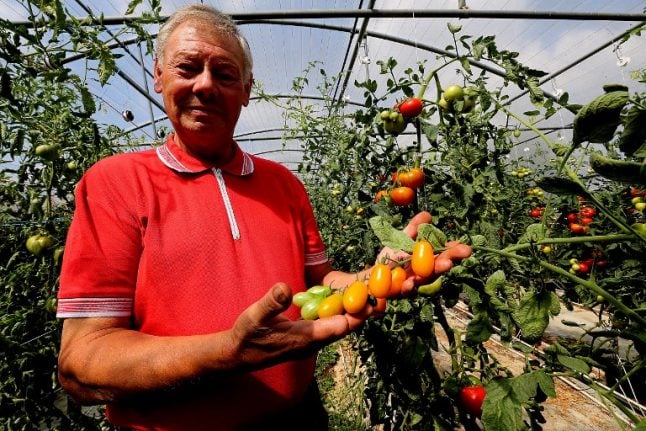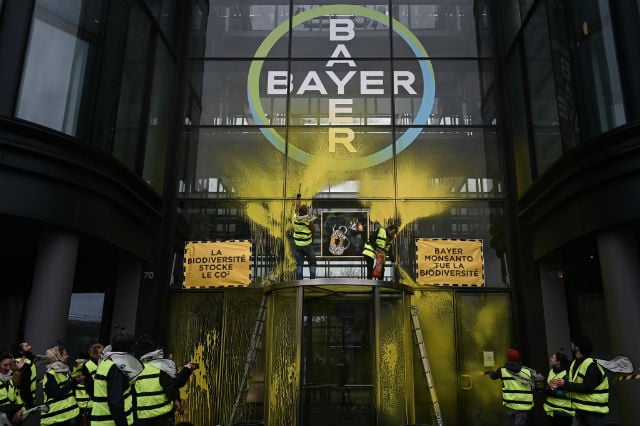“That's a beef tomato, they're delicious,” he says, showing off his produce which, he stresses, is 100 percent organic.
But since he was treated for prostate cancer in 2017, the 70-year-old says he feels constantly exhausted and has to deal with a host of other problems.
“No sex life, that's over. And I am completely incontinent and have to wear pads that I change two or three times a day… On a market that's pretty uncomfortable. I feel really diminished,” he said.
Convinced his illness was caused by exposure to chemicals, he asked for urine tests as soon as he was diagnosed.

Photo: AFP
Despite his hunch, the results still came as a shock.
They detected glyphosate, the chemical used in US biotech giant Monsanto's flagship weedkiller Round Up which some studies and the World Health Organization have labelled carcinogenic.
“I'm convinced that that's what caused my cancer,” Terlet told AFP, saying the chemical was found at levels of 0.25 micrograms per litre of blood and that the tests showed up no other chemicals or traces of medication.
Terlet has joined thousands of people around the world, most of them in the US, who are taking legal action against Monsanto for failing to warn users about the risks of using glyphosate.
The compensation bill could be steep.

A demonstration against industrial giants Monsanto, Bayer and Syngenta in May in Paris. Photo: AFP
In a landmark ruling earlier this month, a California jury awarded a dying groundskeeper damages of almost $290 million (335 million euros) after finding Round Up caused his non-Hodgkin lymphoma.
Monsanto's German parent company Bayer has vowed to appeal the ruling, saying it was “at odds with the weight of scientific evidence”.
But the victory of plaintiff DeWayne Johnson, feted by Monsanto's critics as a modern-day David battling a corporate Goliath, has heartened Terlet, who is hoping for a similar finding by a French court.
The French government, which has vowed to ban glyphosate by 2021, also hailed the “historic” ruling and called on the US and other EU countries to join the “war” against dangerous chemicals.

Claude Terlet. Photo: AFP
'Miracle' chemical
Terlet, a father-of-three from the village of Celles-sur-Aisne near Reims, a city in northeast France, was a devotee of Round Up — the world's most widely-used herbicide — for three decades.
He used it to kill weeds pushing up through the stubble left in his fields after the harvest.
“At the time, they presented glyphosate as being a miracle product.
Everyone was buying it!” he said.
While spraying his fields he wore only a cheap mask and gloves that failed to protect him from the fine mist that seeped into the cab of his tractor.
“We didn't realise the effects it could have in the medium- and long-term.
And now we're seeing them,” he said.
In May 2017, his lawyers filed a complaint with prosecutors in the southern city of Lyon, where Monsanto's parent company Bayer has its French headquarters, accusing it of “poisoning” the pensioner.
Next month, he will undergo tests to try establish whether his cancer is indeed linked to his use of the herbicide.

Photo: AFP
No EU ban yet
He is not the first French farmer to take on Monsanto.
In the first ruling of its kind against Monsanto anywhere in the world, a French court in 2012 found it guilty of poisoning cereal farmer Paul Francois who said he suffered neurological damage after inhaling fumes while using the now banned weedkiller Lasso.
But while France has announced plans to ban glyphosate and Germany wants to heavily curtail its use, the EU has so far refrained from withdrawing its licence.
Farming unions particularly have come out swinging against a ban, saying it would have a disastrous effect on agricultural yields because they have no replacement for it.
Terlet believes that all herbicides are harmful.
In his view, the only safe way to weed plants is by hand, “on condition that it costs less” so as not to harm farmers' livelihoods.
Aware that his battle against Monsanto will be long and costly, he has vowed not to back down.
“I'm stubborn, I'll fight it to the bitter end,” he said.



 Please whitelist us to continue reading.
Please whitelist us to continue reading.
Member comments